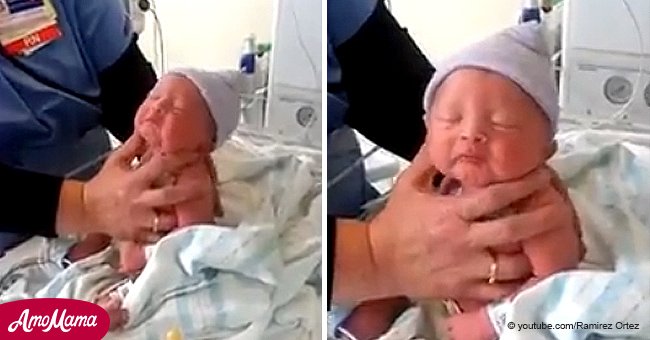
Nurse helps burp a baby boy. When she pats his back, he releases a hilarious sound
After a baby boy was fed in the hospital he was delivered, a nurse began patting his back so he could burp. The sound he produced made everyone laugh.
According to The Epoch Times, the video became viral in no time. One of the most interesting aspects of it is that the baby’s mouth and eyes are closed while he is ‘crying,’ which made things even funnier.
The source pointed out that even the mother, who was filming everything, couldn’t hold back her laughter. Most people know that helping their babies burp is important, but not all of them know why.
Parents.com reported that when babies drink milk, gas gets trapped in their gastrointestinal system. If it is not released, it might cause a feeling of fullness and discomfort, which will result in a crying baby for ‘no apparent reason.’
Doctor Shalini Forbis, a pediatrician and blogger for Dayton Children’s Hospital in Ohio, explained that parents can (and should) help their babies get rid of that air which is known as a burp.
A burp is the gas bubble that babies eject through their mouths that produce a sound. While it is not that common, burps can also be released through the ‘other end’ of the baby, resulting in a different sound and smell.
Sometimes, the burps might contain some of the stomach content. Those are called wet burps or erps. Experts recommend parents to use a burp cloth when burping a baby to avoid the fluids touching them.
Erika Landau, another pediatrician from New York, revealed that even though most babies tend to show they are gassy by crying, some other don’t. Her advice is to burp them even if they don’t cry.
There are three main ways babies get gassy. The first one is by swallowing air while they drink from a bottle. Babies who eat faster usually suffer this problem more frequently.
The second one is the digestion as there are some foods that create gas naturally when they are being processed by babies’ bodies. Foods containing carbohydrates are more likely to create gas.
Finally, food intolerance or allergic reactions might also create gas. If a baby is breastfeeding and the mother ate something that the baby can’t tolerate, he is very likely to be creating more gas.
